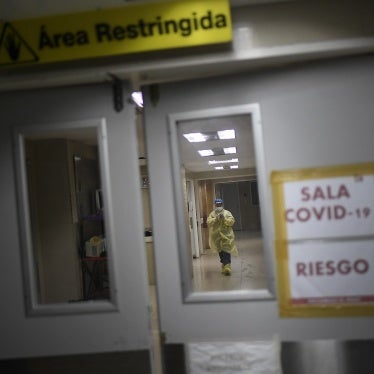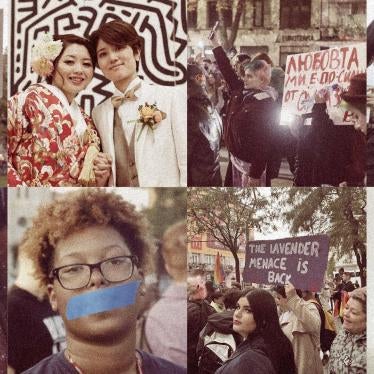Gender-Based Abuses in the Context of HIV
In Zambia, where 17 percent of the adult population is living with HIV/AIDS, women face grave gender-based abuses, in particular domestic violence, which hinder their ability to access or continue using life-saving HIV treatment. Despite Zambia’s impressive roll-out of HIV treatment, the country’s health system and legal framework fail to address these barriers to women’s HIV treatment and as a result, some women living with HIV miss out on life-saving HIV treatment.
Gender-Based Violence
In Zambia, gender-based violence, and in particular domestic violence at the hands of husbands and intimate partners, and the fear of such violence, has a direct impact on women’s ability to start and continue using HIV treatment. Human Rights Watch’s investigation revealed that women are often beaten, slapped, shouted at, verbally abused, and raped upon discussing HIV testing and treatment, after disclosing their HIV status to their husbands, and as a result of visiting health facilities to collect antiretroviral medicine. Some women feel compelled to hide their HIV treatment, and to make up excuses even for experiencing side effects upon commencing HIV treatment. This obstructs women’s ability to access HIV testing, causes them to miss doses of HIV treatment or to miss clinic appointments to collect their medicine. Despite high levels of sexual and gender-based violence (hereafter SGBV) in Zambia the country has no specific legislation criminalizing SGBV, and women must rely on the general Penal Code provisions on assault occasioning bodily harm. Zambia’s Penal Code has no provision for marital rape or psychological abuse. Similarly, Zambia’s healthcare system is ill-equipped to address gender-based violence among women living with HIV/AIDS. Healthcare facilities in Zambia have no systems to detect or address SGBV, and there are no government protocols or training programs on how to address gender-based abuses in HIV treatment programs. The only two shelters in the country are run by a non-governmental organization with little funding from the government. Although the Zambian government has established the Victim Support Unit (hereafter VSU), a special unit of the police charged with addressing a variety of abuses, including domestic violence and property grabbing (see below), lack of human and other resources undermines this unit’s ability to address gender-based abuses. Violence against women, including domestic violence, raises a range of human rights abuses that governments have a direct responsibility to address, even where a perpetrator is not a state actor. These abuses include a woman’s rights to dignity, personal freedom, and physical integrity, as well as their right to freedom from cruel and inhuman treatment. Violation of Women’s Property Rights Zambian women do not enjoy effective legal protection of their property rights and as a result practices like property grabbing (the unlawful appropriation of marital property upon the death of a spouse by in-laws) and the unequal distribution of marital property according to customary law for women who divorce are widespread. Women who are subjected to these practices often suffer abject poverty and are unable to afford transportation to clinics or even afford food to take along with HIV treatment. They therefore experience increased vulnerability to HIV and a reduction of their capacity to respond to the pandemic. Fear of divorce in a context of discriminatory customary laws and where women are economically dependent on men leads some women to remain in abusive marriages, which in turn can impede treatment. This discrimination is sanctioned by Article 23 of Zambia’s current constitution—currently undergoing review—which gives primacy to customary law in marriage-related matters. Although Zambia has a law that regulates distribution of inheritance where the deceased did not leave a will (the Intestate Succession Act of 1989, amended 1996), which should help counter property grabbing, this law is ill-enforced.
Zambia’s Obligations under International Human Rights Law
Zambia has ratified many of the international human rights conventions including the International Covenant on Economic, Social and Cultural Rights (ICESCR), the International Covenant on Civil and Political Rights (ICCPR) and the Convention on the Elimination of All Forms of Discrimination against Women (CEDAW). Under these treaties and others Zambia has an obligation to ensure women do not experience discrimination in relation to their rights including bodily integrity, health, marriage and equality before the law. Under the ICESCR Zambia has obligations to take steps to progressively realize the right to the enjoyment of the highest attainable standard of physical and mental health, including the removal of barriers interfering with women’s access to healthcare services, and the protection of women against violence. CEDAW requires Zambia to accord to women, in civil matters, a legal capacity identical to that of men, and to take appropriate measures to ensure equal rights and responsibilities in marriage and divorce. It accords the same rights to both spouses in respect of the ownership, acquisition, management, administration, enjoyment and disposition of property. To respect its obligations under CEDAW, Zambia should ensure that no law or custom may grant men a right to a greater share of property at the end of a marriage or de facto relationship, or on the death of a relative. Such a law would be discriminatory and affects a woman’s practical ability to divorce her husband, to support herself or her family and to live in dignity as an independent person.
Recommendations:
We hope that the Universal Periodic Review of Zambia will reflect the concerns outlined in our submission, and include the following recommendations in its outcome document:
- Urge the Zambian government to facilitate the establishment and implementation of programs in the healthcare system to address gender-based abuses.
- Urge Zambia to enact a specific law that criminalizes and remedies sexual and gender-based violence.
- Urge the Zambian government to lead a campaign that emphasizes women’s right to decide when, where, and how to seek health services, including access to HIV testing and treatment programs.
- Urge Zambia to ensure that provisions on equality before the law regardless of sex, and provisions prohibiting any law, culture, custom, or tradition that undermine the dignity, welfare, interests, or status of women or men (articles 38-40), are retained in the draft constitution, under discussion.
- Urge Zambia to ensure the provision of adequate training and resources for the Victim Support Unit, including vehicles, sexual crime kits and stationery.
- Urge the Zambian government to ensure better enforcement of the Intestate Succession Act.







